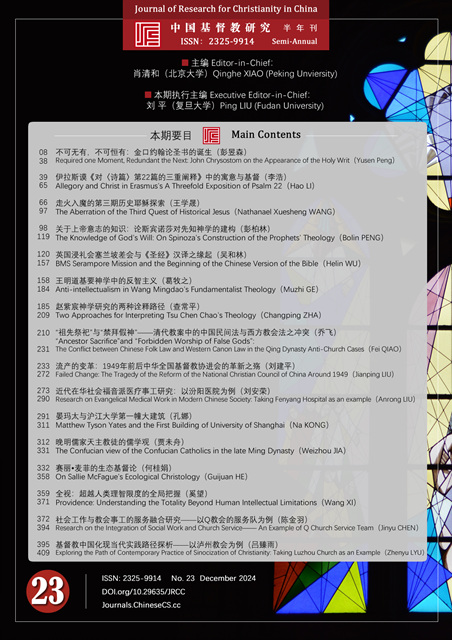Abstract
In the field of Legal culture, the longer the history of a nation, the deeper the accumulation of customary rules. "Ancestor Sacrifice" has a long history in Chinese folk, whether in religious significance, humanistic spirit or cultural sense, it is a code of conduct that must be observed by Chinese, and it is an enduring "law" of Chinese folk. After Christianity has been spread to China, this norm of folk law began to be challenged. In the Qing Dynasty, a large number of anti-church cases were caused by the impact of "Ancestor Sacrifice”. “Forbidden Worship of False gods" is the forbidden norm of the Christian Church, and the belief in one true God is the unshakable foundation and law of Christianity. Except for the "Trinity" God of the Father, the Son, and the Holy Spirit, no one and anything can be the object of worship of believers, otherwise they will commit the "sin" of "worshiping idols" and will be disciplined or punished by God or the Church. The "ancestors" of Chinese folk sacrifice are "men" rather than "gods" in Canon Law, and if the ancestors are worshipped as gods, it is "worship of false gods". The conflict between the "Ancestor Sacrifice" norms of Chinese folk law and the "“Forbidden Worship of False gods" in Western canon law is the substantive cause of many anti-church cases, such as the Jiangxi anti-church Case occurred in 1869, the Fujian Zhao'an anti-church Case in 1881, and the 1890 Hubei Guangji anti-church Case in 1890.
The conflict between "Ancestor Sacrifice" and " “Forbidden Worship of False gods" reflects the conflict between the two legal cultures of "Patriarchal Law" and "Religious Law". "Patriarchy" is a set of behavioral norms rooted in the ethics of blood and established according to the relationship between people. Through the rituals and procedures of the "Ancestor Sacrifice" activities, it is not only possible to pray for the spirits of the ancestors in heaven and bless the families of the living descendants, but more importantly, to further clarify and strengthen the hierarchical structure order between the descendants of the world. Ancestors are not only the "gods" of family belief and worship, but more importantly, the blood and spiritual ties between family members. The ultimate goal of this blood patriarchal worship of family gods is to pin each family member to a certain node in the family network, and its patriarchal function far exceeds its religious function. "Religion" is the unconditional devotion to the object of faith, that is, the wholehearted search for "infinite truth or ultimate reality" beyond secular values. The "“Forbidden Worship of False gods " in canon law shows a distinct "religious" character. Anything that takes the place of God is not a godly faith, and the prohibition of worshipping false gods or idols is a consistent prohibition of canon law. For Christians, God is the Lord of their lives, and the Bible as the Word of God is the "Divine Law" and the highest code of thought and behavior. Although the Bible also requires believers to honor their parents and remember their ancestors, the boundary between God and man is very clear; no matter how great the man is, he cannot replace the position of the absolutely revered God, and the ancestors are certainly no exception. The absolute norms of religion conflict with the customary folk norms of patriarchy, and the occurrence of anti-church cases is therefore inevitable.
However, apart from the narrow elements of national sentiment, this conflict has positive implications for China. At the level of organizational form, the "great unification" social structure under the control of traditional Chinese patriarchal ethics for thousands of years has shown a trend of differentiation in this conflict. At the ideological and cultural level, the "one-dimensional" pattern began to be changed into "pluralism". In terms of social order, the homogeneous monolithic pattern of folk law order began to split. Judging from the principles of legal culture formed in a rule-of-law society, these changes are precisely consistent with the formation trend of a rule-of-law society. The conflict between Chinese folk law and Western canon law, represented by "Ancestor Sacrifice" and " “Forbidden Worship of False gods ", is actually the conflict between China's indigenous legal culture and The Christian legal culture with the "rule of law" gene. This conflict is afflictive for Chinese, but it has positive significance for the transformation of Chinese society.

This work is licensed under a Creative Commons Attribution-NonCommercial-NoDerivatives 4.0 International License.
Copyright (c) 2024 Journal of Research for Christianity in China (JRCC)

